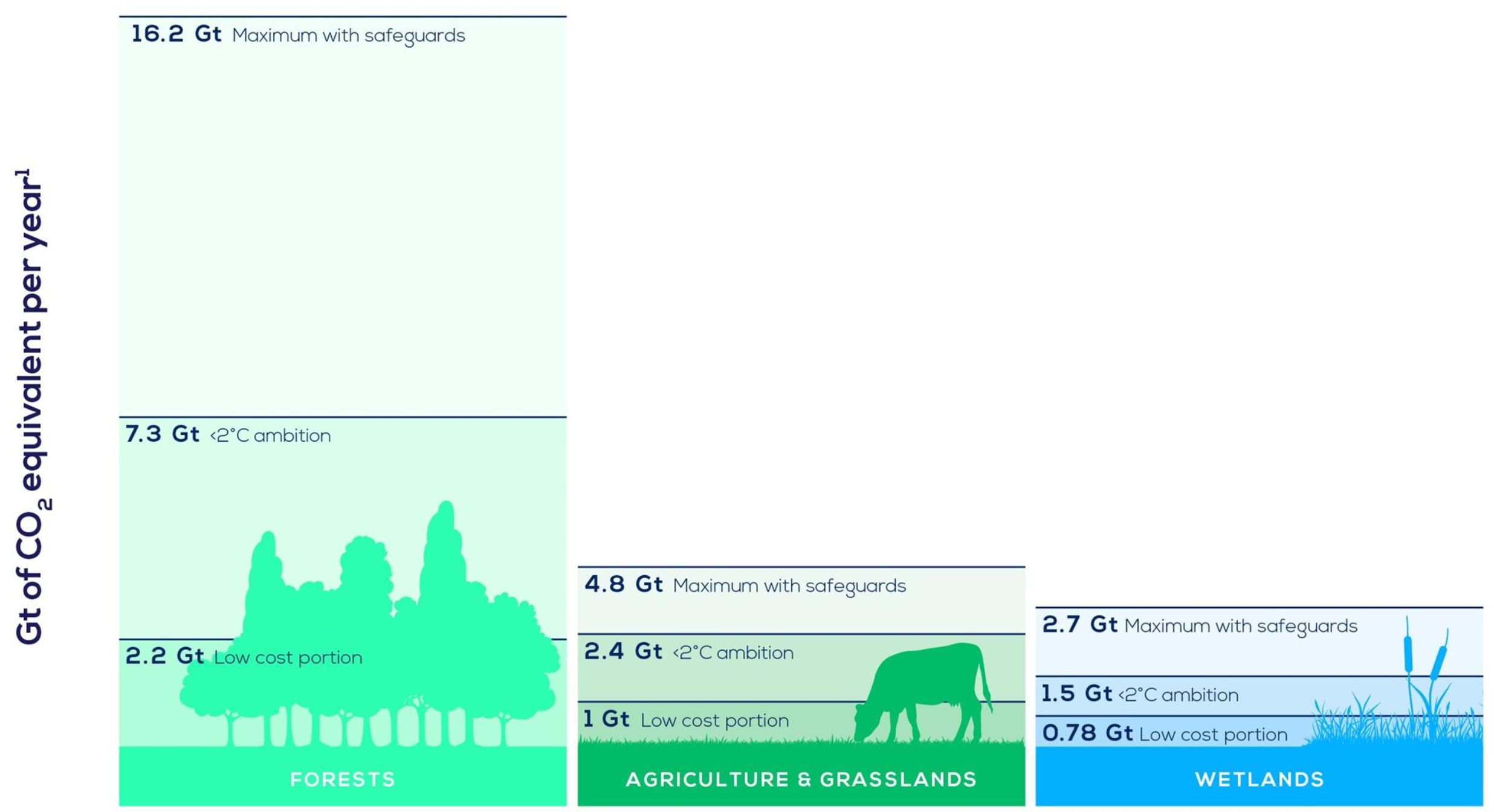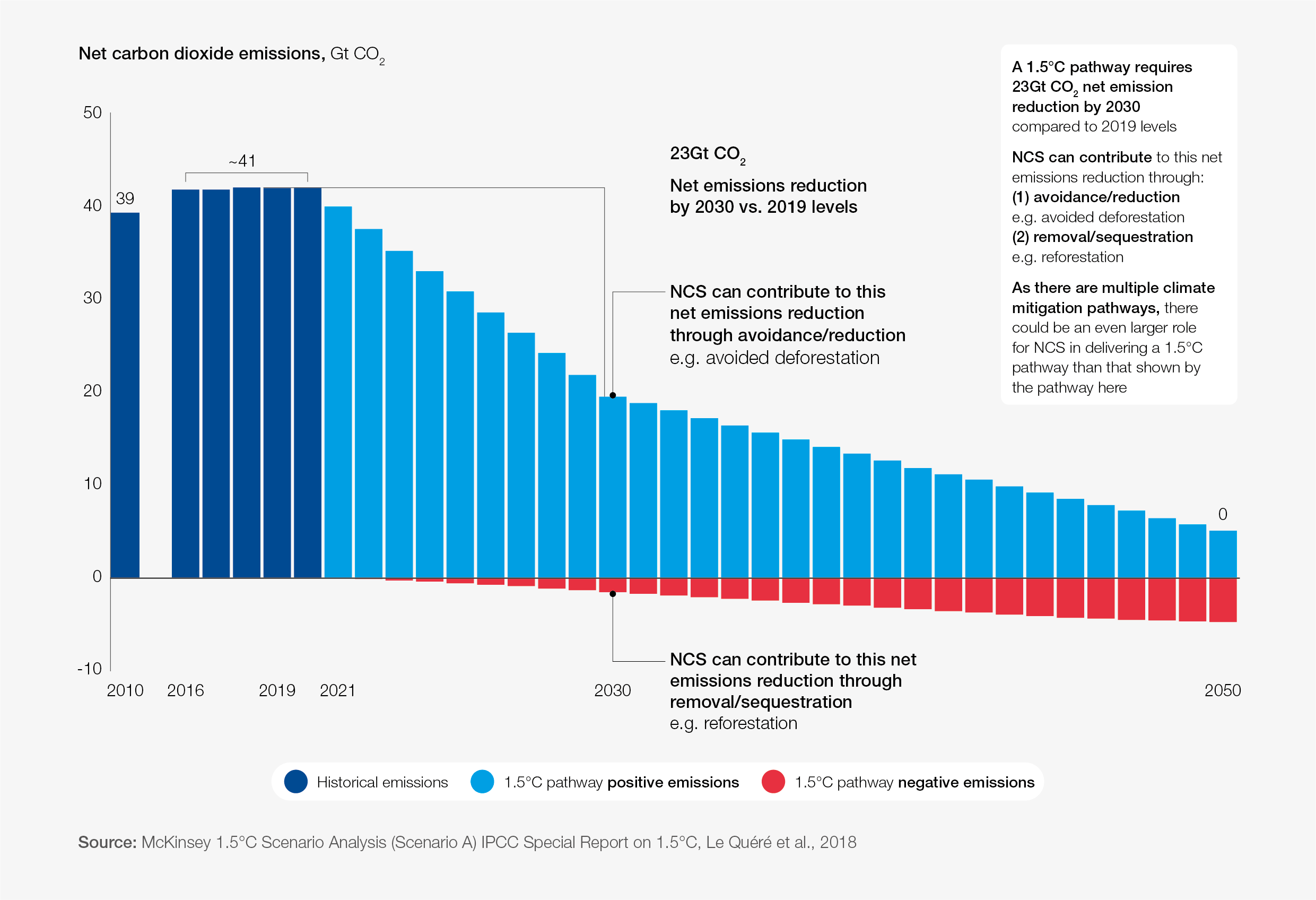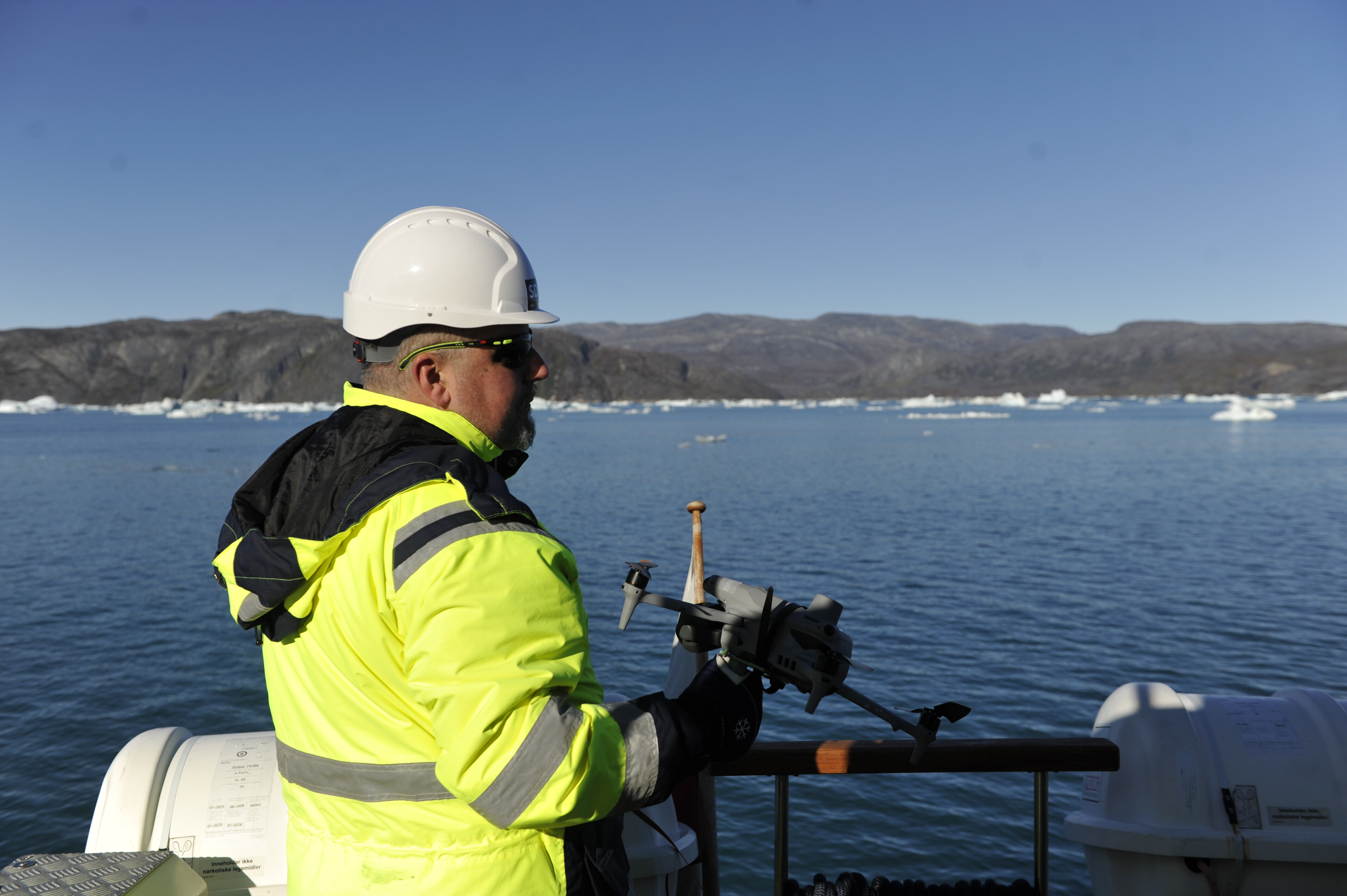Natural climate solutions can help businesses meet climate goals. Here's how

The global loss of tropical forests contributes about 4.8 billion tonnes of carbon dioxide per year. Image: Unsplash.
- Public-private stakeholders need to work with nature to help tackle global biodiversity and climate challenges.
- Natural climate solutions help conserve, restore and improve ecosystems while increasing greenhouse gas emissions storage.
- New report, Natural Climate Solutions for Corporates, provides vital guidance for the private sector on how to scale-up NCS investment.
We are facing an unprecedented crisis: the destruction of nature and the rampant effects of climate change. As much as 1 billion tons of CO2 is released each year from degraded coastal ecosystems, the global loss of tropical forests contributes about 4.8 billion tonnes of carbon dioxide per year, and food systems contribute 21–37% of annual emissions.
For too long, climate change and habitat loss have been discussed in siloes. However, reports like the IPBES-IPCC Co-Sponsored Workshop highlight that limiting global warming to ensure a habitable climate and protecting biodiversity are mutually supporting goals. Achieving them will be essential to provide benefits to people.
What are natural climate solutions and how can they be used?
Nature offers up to one-third of the solution to the climate crisis to 2030 in the form of Natural Climate Solutions (NCS). These are actions that conserve, restore or improve the use or management of ecosystems while increasing the storage of carbon and alongside radical emissions reductions, have a critical role to play in ensuring we limit global temperature rise to 1.5C. As well as their benefits for climate, NCS also provide powerful co-benefits like restoring habitats for biodiversity, improving water quality, decreasing soil erosion, increasing soil fertility and bringing many social and economic benefits to local communities living close to nature.

For example, a group of stakeholders, including Conservation International, worked to protect a mangrove forest in Cispatá, along Colombia's Caribbean, with funding by Apple. The project produced the first blue carbon credits – using the Verified Carbon Standard and the Climate, Community and Biodiversity standard. It is anticipated that it will remove about 1 million metric tons of emissions over 30 years and drive crucial financing to improve local education, employment, and sustainable livelihood opportunities.
NCS are not just mitigation solutions, they are societal solutions; supporting adaptation, resilience, and development approaches too. For example, the Great Green Wall of Africa initiative combined indigenous leadership and women's empowerment as a dual strategy to drive nature restoration.
The most sustainable and impactful NCS will be those that protect or restore biodiverse, functional ecosystems and empower and benefit local actors.
”NCS and voluntary carbon markets need to scale-up
But despite their irrefutable contributions to nature, climate and people, NCS's potential is limited by the lack of finance directed at them. Approximately $133 billion per year is invested in biodiversity and ecosystem restoration and conservation. However, to meet our climate change, biodiversity and land degradation targets, we need to triple this by 2030. As a result, experts are urging governments, financial institutions, and businesses to place nature at the heart of their decision-making to close the nature financing gap. Much-needed finance can be funnelled into NCS by revenue generated from the purchase of NCS carbon credits.
High-quality carbon credits can help finance some of the significant investments required for nature conservation and restoration.
”NCS activities that remove CO2 from the atmosphere or prevent CO2 from being emitted into the atmosphere can be verified by an independent standard (such as Verified Carbon Standard, Gold Standard, Carbon Action Reserve, Winrock’s ATC/ARC ) and issue carbon credits. International voluntary carbon markets (VCM) provide a platform for individuals and organizations to purchase and retire (cancel in a registry after which it can no longer be sold) carbon credits generated by NCS projects.
Demand for carbon credits is anticipated to grow by up to 1 billion tons of CO2 per year by 2030. However, the growth of VCM needs to happen within a framework of strict rules and high standards for environmental integrity across all sectors. Companies' climate commitments will increasingly drive them to participate in the voluntary carbon market. As more organizations enter the market, we are already starting to see it accelerate the development of more rigorous standards and practices that will improve VCM’s architecture.
The global community must catalyse business and policy action to halve emissions by 2030 and accelerate an inclusive transition to a global net-zero economy by 2050.
Enabling the private sector to meet climate targets
Several governments, investors, and companies are answering the call to set net-zero and nature-positive targets. For example, the UN Principles for Responsible Investment estimated that some 42 companies announced net-zero targets in 2020, with over half aiming to include NCS. But while governments, civil society, and consumers all have essential roles in accelerating NCS, businesses are vital in driving the required investment to scale NCS to meet their full climate mitigation potential.
High-quality carbon credits can be purchased to offset emissions, but as Jesper Nielsen, Managing Director and Senior Partner, BCG, points out, “We also need companies to decarbonize their value chains in line with the Paris Agreement. So, it is not a trade-off; we need both decarbonization and investment in nature.”
Businesses need NCS investment guidance for climate strategies
Thomas Lingard, Global Sustainability Director of Unilever said, "We find ourselves in a race against time to limit global average temperature rise to 1.5 degrees, halt tropical forest loss and the biodiversity crisis. That's why business interest in natural climate solutions that contribute to all these objectives is rightly gaining momentum."
However, ambition to scale NCS is hampered by several difficulties, both real and perceived. Some of these concerns include companies prioritizing offsets over reducing emissions within their operations, or relate to the quality of carbon credits used in offsetting.
Complexity surrounding emissions reduction pathways, net-zero targets, carbon credits and company claims is a barrier to many companies taking action.
”Lingard adds, “Appropriate guidance to help businesses structure their climate strategies is needed.”
A coordinated and integrated approach to NCS is needed
Coalitions of highly ambitious organizations are coming together to build trust across different stakeholder groups and provide guidance. The Natural Climate Solutions (NCS) Alliance is a multistakeholder platform, creating one such space to bring together credit originators, corporate buyers, and civil society organizations to identify and overcome barriers to investments into NCS.
What is the World Economic Forum doing on natural climate solutions?
In response to this need for businesses and corporates to invest in NCS – while ensuring that rigorous environmental and social safeguards are upheld – the NCS Alliance is launching the Natural Climate Solutions for Corporates guidance. This new publication provides vital guidelines on how the private sector can scale-up investment to protect and restore nature's potential by investing in high-quality NCS through carbon markets. These guidelines call for ambitious emissions reduction strategies consistent with the Paris Agreement, high integrity supply of NCS credits and robust international markets.
NCS are a proven and effective tool for tackling the climate crisis, reversing biodiversity loss, and delivering myriad benefits for community wellbeing.
”According to Dharsono Hartono, CEO of PT Rimba Makmur Utama, “Providing we demonstrate credibility, transparency and high environmental integrity from project developers to crediting programmes to committed corporations, NCS can and should play a vital role in our global mitigation efforts.”
Not only do NCS have the potential to address the nature and climate crisis, but they also carry the potential to build resilient and biodiverse ecosystems for generations to come.
Don't miss any update on this topic
Create a free account and access your personalized content collection with our latest publications and analyses.
License and Republishing
World Economic Forum articles may be republished in accordance with the Creative Commons Attribution-NonCommercial-NoDerivatives 4.0 International Public License, and in accordance with our Terms of Use.
The views expressed in this article are those of the author alone and not the World Economic Forum.
Stay up to date:
Future of the Environment
Related topics:
Forum Stories newsletter
Bringing you weekly curated insights and analysis on the global issues that matter.
More on Climate Action and Waste Reduction See all
Noelia Garcia Nebra
November 18, 2025









